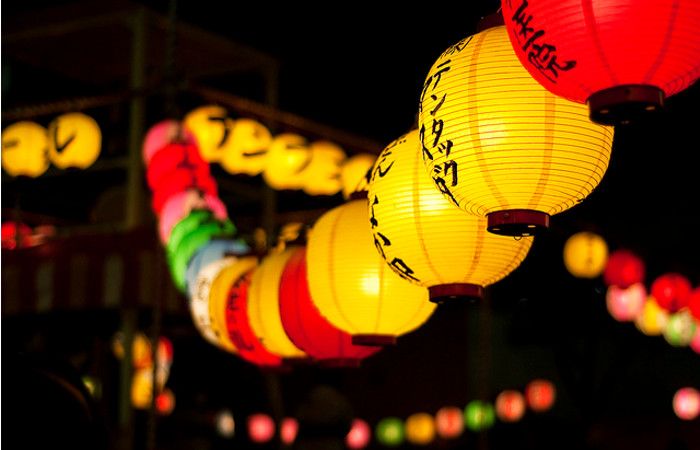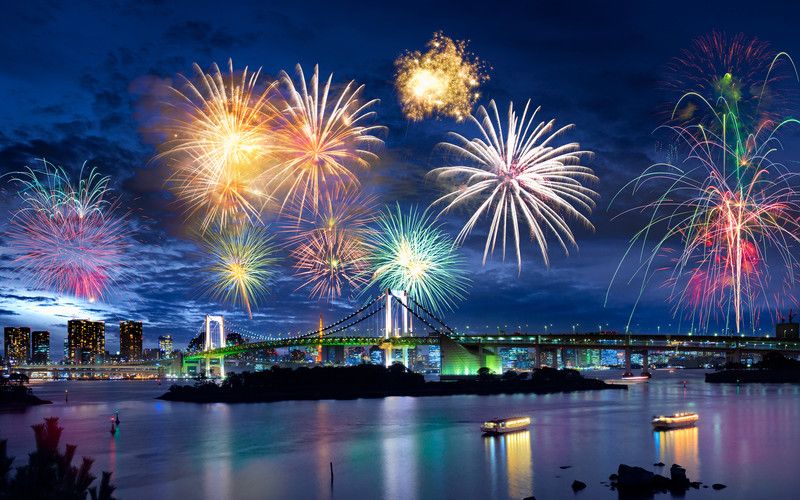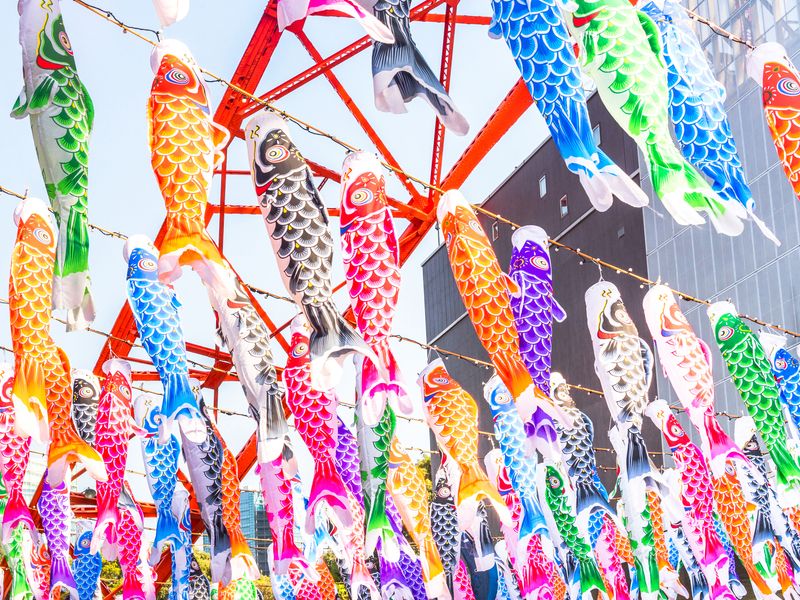Holidays in Japan are unique, spectacular occasions that visitors, as well as locals, can enjoy. However, they are also very busy times of the year. So, travelers should expect crowds on Japan’s transportation system and higher accommodation prices.
Visitors should also be aware that events such as the Obon Festival, the cherry blossom season, Golden Week, Christmas, and New Year’s Eve are also very busy times of year to visit Japan.
People catching Shinkansen bullet trains should make early reservations during these periods when possible.
Japanese holiday calendar 2026
Below, you can check out the exact dates for the 17 public holidays that will be celebrated in Japan throughout 2026:
| National Holiday | Date |
|---|---|
| New Year’s Day | January 1 |
| Coming of Age Day | January 12 |
| National Foundation Day | February 11 |
| Emperor’s Birthday | February 23 |
| Vernal Equinox Day | March 20 |
| Showa Day | April 29 |
| Constitution Memorial Day | May 3 (observed May 6) |
| Greenery Day | May 4 |
| Children’s Day | May 5 |
| Marine Day | July 20 |
| Mountain Day | August 11 |
| Respect for the Aged Day | September 21 |
| Extra holiday for Silver Week | September 22 |
| Autumnal Equinox Day | September 23 |
| Sports Day | October 12 |
| Culture Day | November 3 |
| Labor Thanksgiving Day | November 23 |
There will be less 3-day weekends in 2026 than 2025, as less major public holidays fall on a Sunday. Only Constitution Day falls on a Sunday, and will be observed on the following Wednesday.
However, Respect for the Aged Day and Autumnal Equinox Day fall on a Monday and Wednesday, which along with a Bridge Public Holiday, makes for a 5-day long weekend that’s known as Silver Week. This only happens every 5 years.
Public holidays in Japan explained

Let’s break down the most important public holidays in Japan:
- New Year’s Day: Families gather to see in the new year, and businesses shut down from January 1 to January 3. People throw bonenkai parties (“forgetting parties”) to symbolize leaving behind last year’s problems and making a fresh start.
- Coming of Age Day: Coming of Age Day is held on the second Monday of January. It is held to congratulate all the young people who have turned 18 between April 2 of the previous year and April 1 of the current year. Special ceremonies are held nationwide.
- National Foundation Day: February 11 marks National Foundation Day. It is a nationwide celebration of patriotism. The celebrations are fairly low-key, though there are some events in Tokyo and the other big cities.
- The Emperor’s Birthday: This day is celebrated annually on February 23, the birthday of the reigning Emperor of Japan.
- Shōwa Day: Shōwa Day is held on April 29. It honors the birthday of Emperor Shōwa (Hirohito). Showa means “bright peace” in Japanese, and it symbolizes the era of his reign (from 1926 to 1989).
- Constitution Memorial Day: May 3 marks the Constitution Memorial Day. It is part of Golden Week and celebrates the 1947 Constitution of Japan, which came into effect a couple of years after the end of World War II.
- Greenery Day: It is celebrated on May 4 of each year and is dedicated to the contemplation of nature. This day is part of Golden Week. Until 2006, the celebration was held on April 29. In 2007 it became Shōwa Day in honor of the emperor who reigned in Japan for 62 years and particularly during World War II.
- Children’s Day: Children’s Day typically takes place on May 5 and marks the end of Golden Week. It is an ancient celebration that respects the happiness and personalities of children. Families play with traditional toys and eat special types of cakes.
- Marine Day: Marine Day (also known as Sea Day) takes place on the 3rd Monday of July. The holiday celebrates the sea and its importance to Japan as an island nation. Many local people take advantage of this day to enjoy the beach.
- Mountain Day: Mountain Day is usually celebrated on August 11. It is Japan’s newest holiday, as it was only introduced in 2014. The day gives people the chance to enjoy Japan’s stunning mountains by going hiking and enjoying other activities.
- Respect for the Aged Day: Respect for the Aged Day is held to honor Japan’s elderly citizens. It is held on the 3rd Monday of September. The day was introduced in 1966 and the media often use the day as an opportunity to highlight the country’s oldest people.
- Sports Day: The second Monday of October is Health and Sports Day. It commemorates the opening of the 1964 Tokyo Olympic Games and promotes sports and living an active lifestyle.
- Culture Day: Culture Day promotes the arts and learning. It normally takes place on November 3. Typical activities include exhibitions, parades, and award ceremonies for distinguished artists and scholars.
- Labor Thanksgiving Day: Labor Thanksgiving Day is held on November 23. Events are held throughout the country, including the Nagano Labor Festival. This encourages people to think about the environment, peace and human rights.

